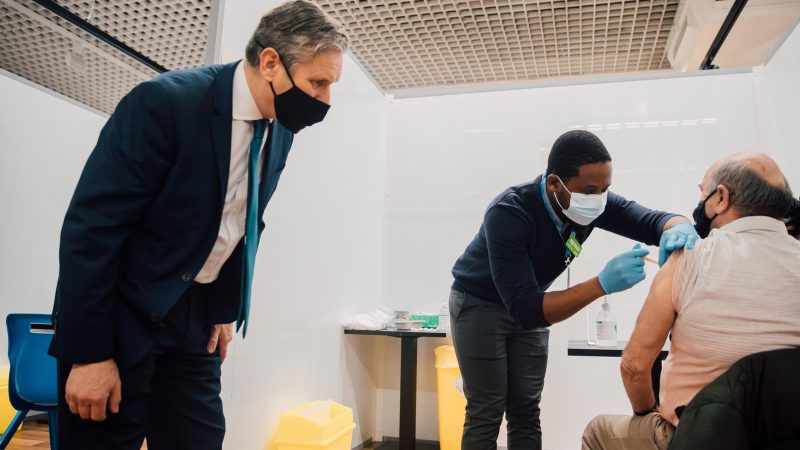
President Joe Biden gave hope to the world that an end to the pandemic could be in sight three weeks ago. Seeing the devastating scenes of India’s crisis, his administration announced it would support a temporary waiver of intellectual property rules on Covid vaccines. It was a bold statement of leadership and Labour was quick to welcome the move, saying that it is vital the government “follows the Biden administration’s lead and engages constructively to develop a workable plan”.
When Labour announced its own plan to transform global vaccine production last week, the party again welcomed “the lead shown by the Biden administration” and called for the government to engage in discussions. But an intellectual property waiver was not, in itself, one of the ten points in Labour’s plan.
When LabourList sought clarification, a Labour spokesperson responded: “The Labour Party said two weeks ago that we welcomed the US support for a patent waiver and now want to see these proposals translated into concrete action. But producing vaccines on the scale and at the pace the world needs will require not just access to patents, but the construction of new facilities; the mass supply of equipment, technology, raw materials; and the transfer of skills and knowledge. That is why Labour has proposed a comprehensive plan covering all these elements, which together can transform the fight against Covid and future pandemics as well.”
While the Biden administration and the more than 100 countries demanding a waiver are, I’m sure, glad that Labour welcomes the move, the party seems to be at pains to stop short of explicitly voicing its support. It is a strange, contorted fudge of a position that has plagued civil society organisations campaigning for a waiver for months. Labour’s frontbench team have been keen to discuss how to scale up global vaccination but, when push comes to shove, won’t clearly commit to the most significant solution.
Labour is right to highlight that a temporary intellectual property waiver alone will not solve the problem of global vaccine supply. Nonetheless, a waiver will be essential if any of Labour’s proposed solutions are to have a serious impact. A waiver would unlock the world’s unused capacity to produce jabs, radically upscaling global vaccine production. But it is not actually a particularly radical proposal. It works entirely within the framework of the World Trade Organisation agreement on intellectual property, which has exemptions for exceptional circumstances.
The waiver is, rightly, supported by prominent figures on Labour’s left, including MPs John McDonnell, Richard Burgon, Diane Abbott and Zarah Sultana. But it is also supported by Labour’s last Prime Minister Gordon Brown, shadow charities minister Rachael Maskell and the chair of the international development committee Sarah Champion. That’s not to mention the widespread support from unions, charities, NGOs and prominent figures from Harry and Megan to the Pope.
Unless the frontbench team explicitly states its support in no uncertain terms, Labour will be the only opposition party in parliament not pressing the government clearly to support a waiver, positioning it to the right of the Lib Dems, the SNP and the Green Party. Even former Conservative ministers like Jeremy Hunt have stated that they support an intellectual property waiver.
It is true that a waiver will not increase production overnight. But more than six months have passed since it was first proposed by India and South Africa. In that time, factories have sat idle that could have produced the doses desperately needed in countries like India. And that vaccine production capacity will continue to go unused until world leaders break Covid vaccines free from the monopolies of a small number of pharmaceutical companies.
As Labour’s former Shadow Attorney General Shami Chakrabarti wrote earlier this month: “There can be no ‘global Britain’ if we remain complicit in this human rights catastrophe.” These intellectual property barriers are driving unfathomable suffering – and, as a former human rights barrister himself, Labour leader Keir Starmer must not sit on the fence.
With global momentum behind a waiver building, the British and German governments will soon be the last remaining defenders of a system that secures vaccines for wealthy countries while leaving low and middle income nations to suffer. The whole world looks to the UK, ahead of the G7 in June, to see if our government will budge. Without clear and persistent domestic pressure from the opposition, Britain will continue to defend this brutal system of vaccine apartheid. Until Labour can clearly, publicly and explicitly state its support for an intellectual property waiver, that pressure will be painfully absent.




More from LabourList
‘Turning public services around: Haringey’s story of child protection’
‘Can Labour turn the green tide back to red?’
Tom Belger column: ‘Why is Labour making migrant exploitation easier?’